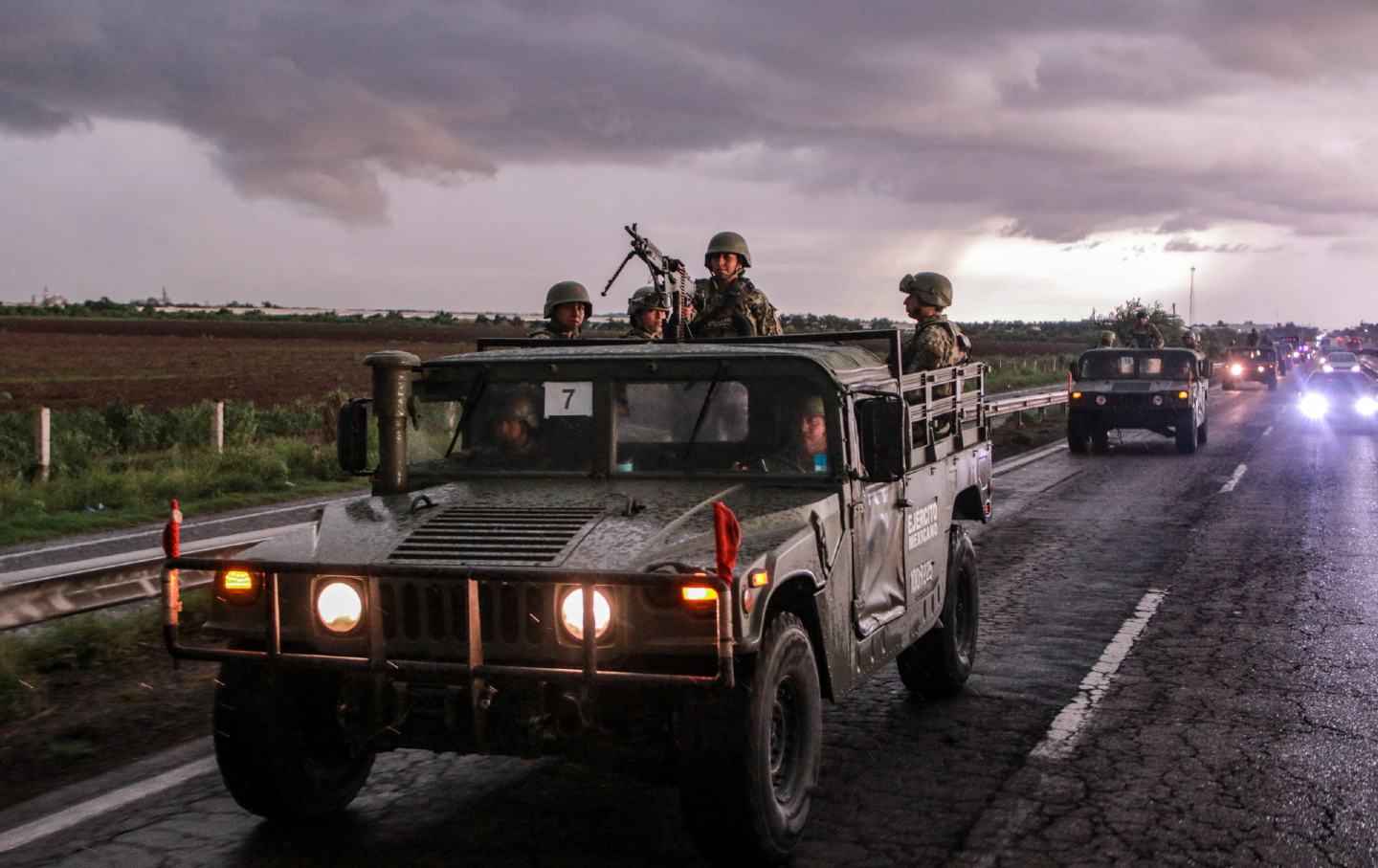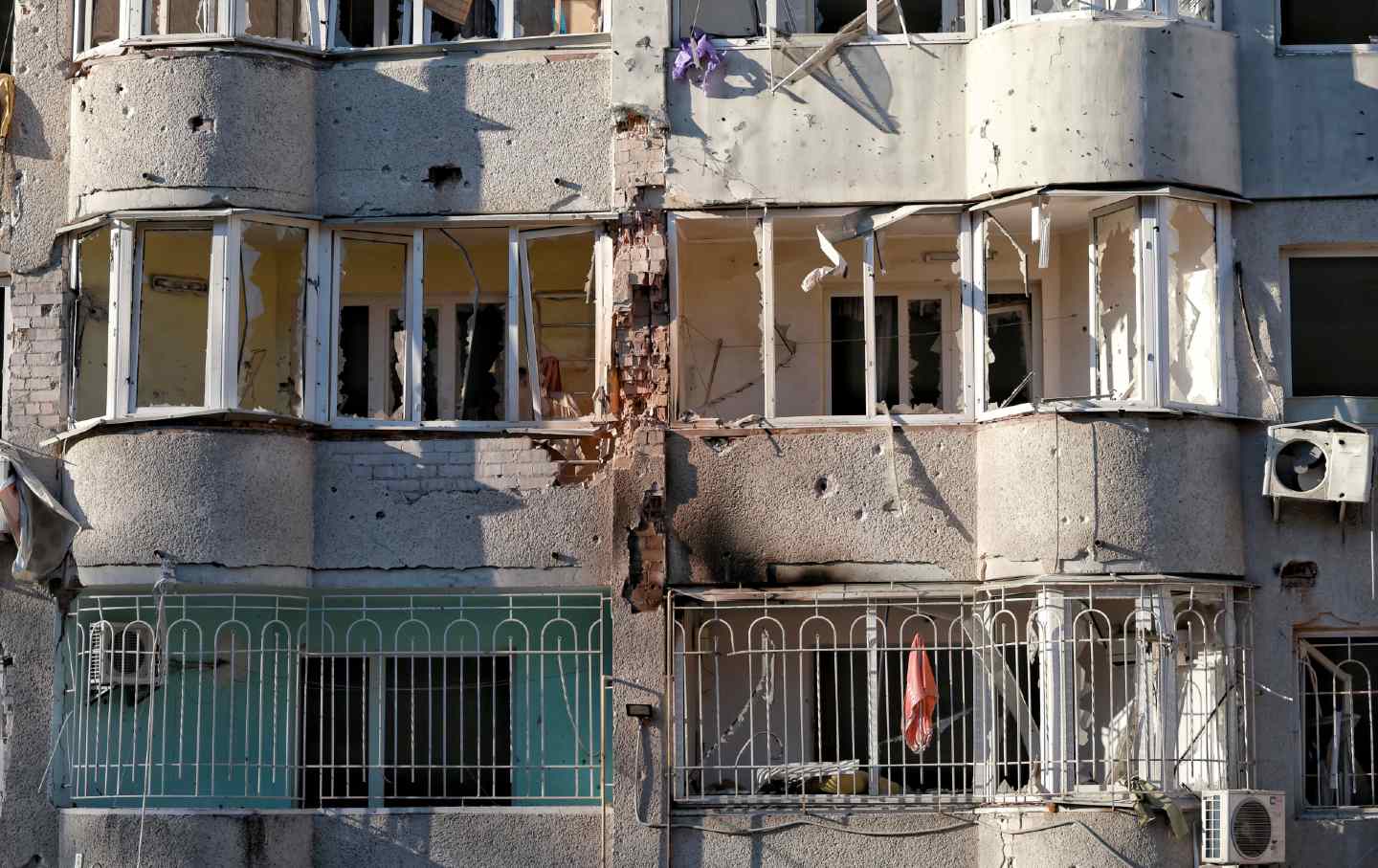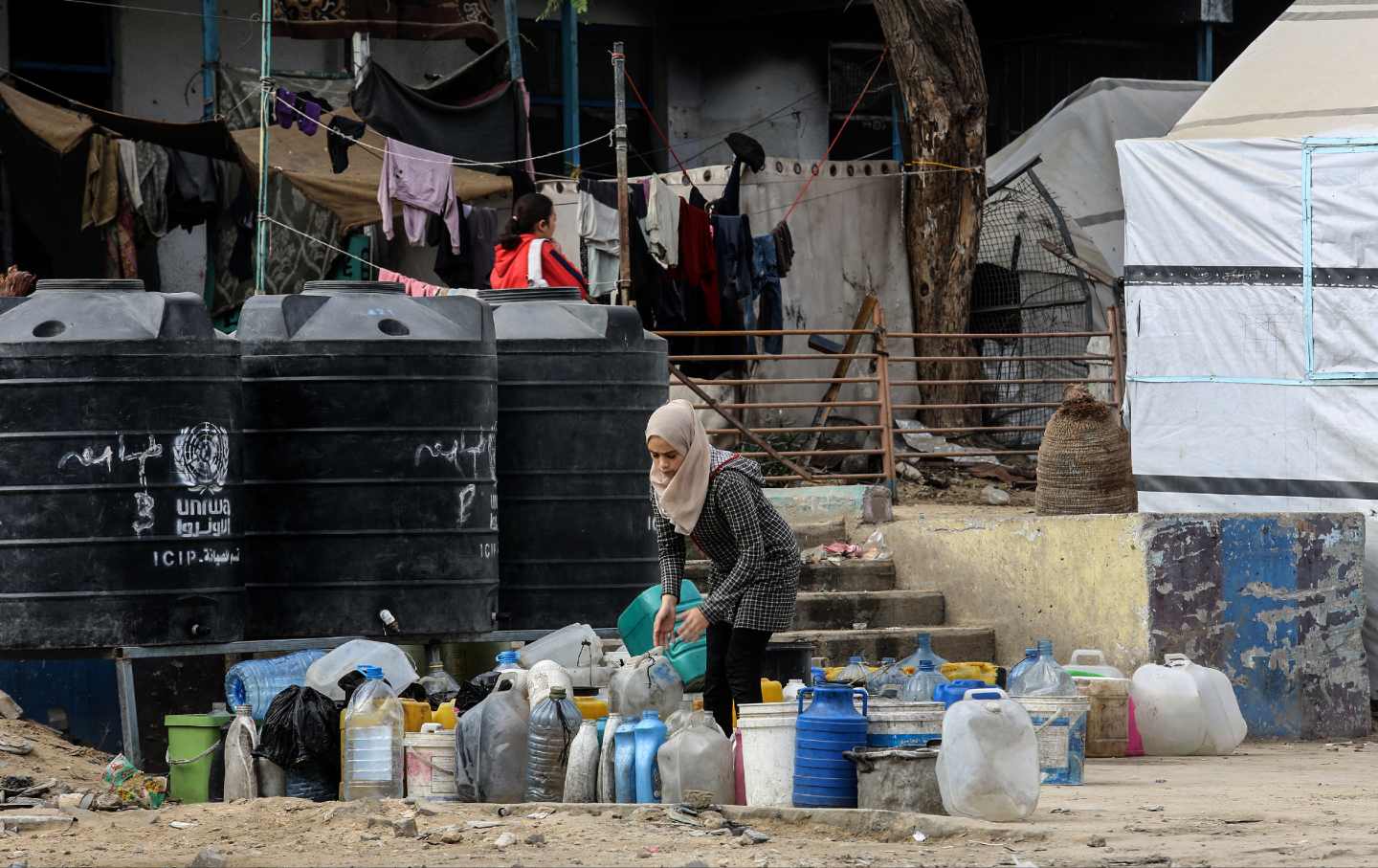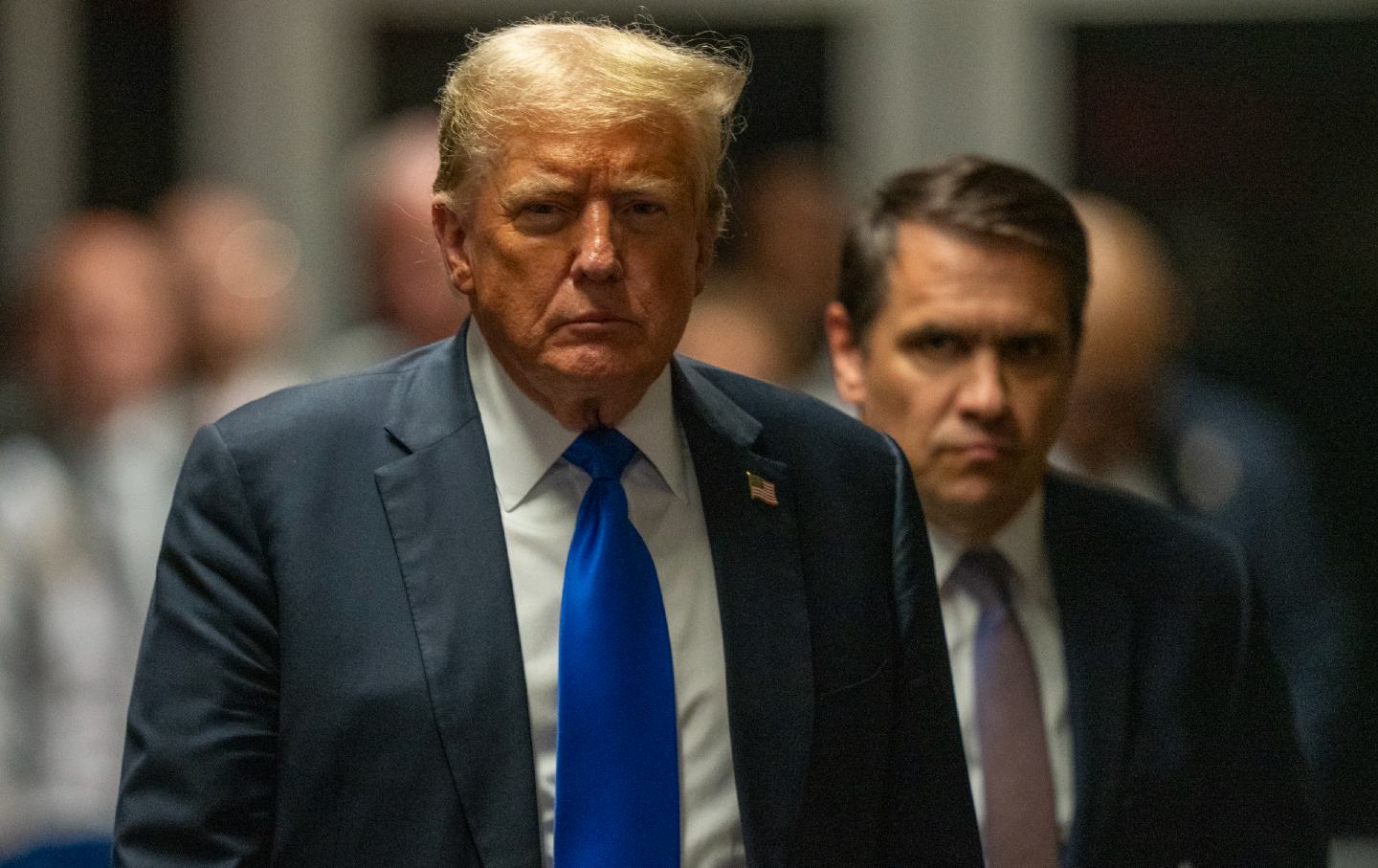It’s Time to Negotiate With Russia
Diplomacy will be ugly, but peace must be the ultimate goal.
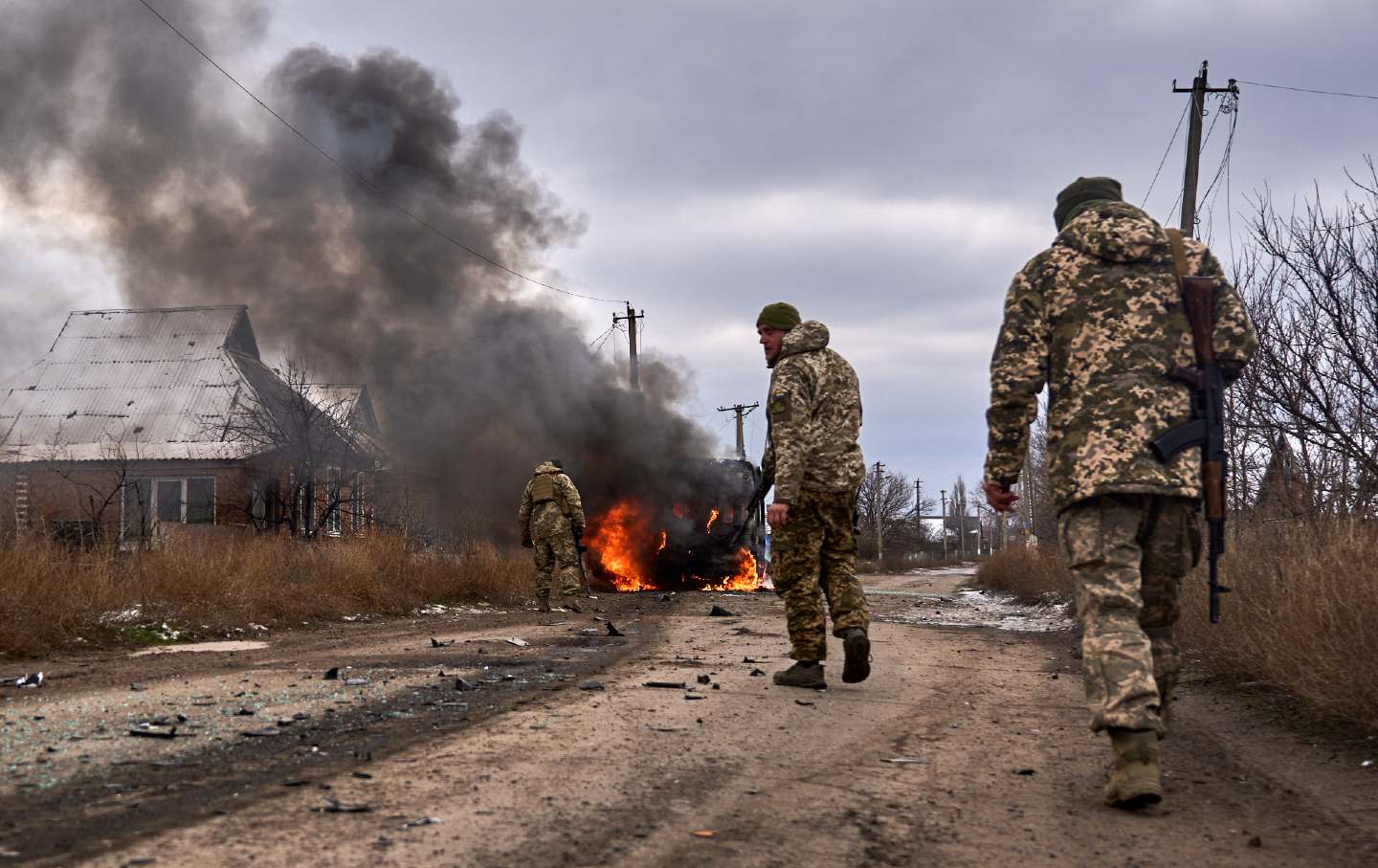
Ukrainian soldiers pass by a volunteer bus burning after a Russian drone hit it near Bakhmut, Donetsk region, Ukraine, on November 23, 2023.
(Shandyba Mykyta, Ukrainian 10th Mountain Assault Brigade "Edelweiss" via AP)It was a startling, if overlooked, admission at the start of November, nearly two years into Russia’s horrific invasion of Ukraine: The conflict did not, despite the repeated insistence of internationalists in the West, resemble World War II. “Just like in the First World war we have reached the level of technology that puts us into a stalemate,” Ukraine’s commander in chief, Gen. Valery Zaluzhny, told The Economist. “There will most likely be no deep and beautiful breakthrough.”
Such talk, for many months, seemed verboten. Analysts, pundits, and scholars residing on the left and right alike cheered on a war effort viewed as both existential and blessed. Ukraine would win—it was only a matter of time, like the Americans storming Normandy beach or the taking back of the skies in the Battle of Britain. The Ukrainian counteroffensive, with enough American cash and weaponry, would break Vladimir Putin’s Russia, driving his troops out of the country and even freeing Crimea. “Ukraine is going to liberate Crimea by the end of August,” predicted Ben Hodges, a retired Army officer who served as commanding general, United States Army Europe, in January. “We know that from history that war is a test of will and it’s a test of logistics,” Hodges said. “Clearly Ukrainian soldiers and the Ukrainian people have the superior will.”
“The logistical situation for Ukraine gets a little better each week,” he added. “The Russian logistics system is frail.”
Yet, in the first five months of the counteroffensive, the Ukrainian military managed to advance by just over 10 miles. Rather than charge, blitzkrieg-style, through Russian defenses, Ukrainian troops have been shelled by artillery and drones as they slog across bloody minefields. Each side is sophisticated enough to know what the enemy is doing: Sensors identify any concentration of forces and precision weapons can destroy them immediately. Russia cannot fulfill its objective of a total conquest of Ukraine, but chasing Russian troops completely out of the east or freeing Crimea is a fantasy now on par with cajoling the tyrant Putin to suddenly embrace representative democracy.
The brutal stalemate was predictable enough once the thick, bilious clouds of propaganda were chased away. In the summer of 2022, Anatol Lieven, a senior fellow with the Quincy Institute and a Nation contributor, warned that the front lines in the war would freeze as enormous casualties piled up on both sides. Few commentators in the West wanted to acknowledge the long shadow of World War I; just as in the 1910s, rapid technological advances had inordinately strengthened the power of military defenses. Mobile drones and anti-aircraft missiles dominate today’s battlefield, eviscerating conventional tanks and attack helicopters. What worked against Russia in the early months of the war—a dug-in military that could effectively counterstrike—would now confound Ukraine.
Despite this, calls for a negotiated peace were dismissed as little more than the appeasement of fascists. Ukraine, with its own fraught democracy and furious crackdowns on dissent, was recast, in Manichean fashion, as a heroic beacon, beyond reproach. Whatever its president, Volodymyr Zelensky, demanded of the United States and Europe must be granted; for certain Democratic and Republican members of Congress, a blank check for the war effort and what amounted, in short order, to an American proxy war with Russia would be the only course of action.
The logic of utter Russian defeat never held because Russia is a far larger country than Ukraine. Russia can lose 150,000 troops and call up more. The Wehrmacht could not defeat the Soviet army in a war of attrition. There’s little reason to believe, even with more time—more casualties, a greater risk of nuclear escalation—all of Ukraine’s battleground objectives will be achieved. It still remains controversial to say that the United States should help decide how this war ends, but the US funds the Ukrainian military, provides crucial intelligence and training, and does everything short of funnel young Americans to the front, even if Lloyd Austin, the secretary of defense, occasionally threatens politicians with that bleak possibility.
How will this war end? The question must be asked, because none of this is sustainable. The Biden administration will have to reckon with the reality that tens of billions in military aid has bought, at best, a stalemate, and any attempt to obliterate Russia in the way Zelensky and his allies still long for could precipitate World War III, with large enough nuclear arsenals on each side to exterminate the human race many times over. Diplomacy will be ugly, in one sense, because it will not satisfy the craving for karmic justice; Putin will exit the war with either more than he entered with or with the assurance that Crimea remains a Russian territory. Ukraine may never join NATO. But peace must be the end goal. How long can Ukrainians perish in the maw of the Russian defenses? How many more civilians must die? And how long can the US and Russia risk a direct clash—an outcome that would have been viewed as nigh apocalyptic by even the Cold Warriors of the 20th century?
All of this comes as Congress and the European Union fail, for different reasons, to offer the latest round of military aid that Zelensky says Ukraine needs to win the war. The Biden administration wanted Congress to swiftly approve $60 billion more. It was left to Republicans, and a few dissident Democrats, to ask how exactly the money would be spent and how it would guarantee the victory that was supposed to be imminent. The Stinger missiles, the Patriot missiles, the Javelin missiles, and the Leopard tanks were all supposed to win the war. Cluster munitions, which world governments have tried to ban because they kill and maim so many civilians, were the essential weapons needed to “dislodge” the Russians forces, according to the RAND Corporation. American taxpayers are rightfully wary. They never voted to indefinitely finance a war being waged many thousands of miles away.
When each of these escalatory weapons fail to deliver the breakthroughs promised, the default of the American and Ukrainian governments is to simply demand more, with pliant media in each nation to bang the drum for perpetual conflict. The United States—along with Europe or other influential nations that have remained neutral in the war, like India or Brazil—must spearhead eventual peace talks because Zelensky, politically, cannot. Zelensky has every incentive to fight on, to both maintain his standing as a neo-Churchill and to stave off nationalist demonstrations or an eventual coup. But with enough American pressure, Zelensky would likely head to a negotiating table with Putin, who will eventually realize, even he doesn’t already, he cannot achieve his maximalist aims in Ukraine. The greater and still unanswerable question is what terms the Ukrainian and Russian government can accept to enter into a cease-fire, but the only way to find out is to negotiate. The US must work to stop the slaughter and save Ukrainian civilians from a war that could devour the rest of the decade.
We cannot back down
We now confront a second Trump presidency.
There’s not a moment to lose. We must harness our fears, our grief, and yes, our anger, to resist the dangerous policies Donald Trump will unleash on our country. We rededicate ourselves to our role as journalists and writers of principle and conscience.
Today, we also steel ourselves for the fight ahead. It will demand a fearless spirit, an informed mind, wise analysis, and humane resistance. We face the enactment of Project 2025, a far-right supreme court, political authoritarianism, increasing inequality and record homelessness, a looming climate crisis, and conflicts abroad. The Nation will expose and propose, nurture investigative reporting, and stand together as a community to keep hope and possibility alive. The Nation’s work will continue—as it has in good and not-so-good times—to develop alternative ideas and visions, to deepen our mission of truth-telling and deep reporting, and to further solidarity in a nation divided.
Armed with a remarkable 160 years of bold, independent journalism, our mandate today remains the same as when abolitionists first founded The Nation—to uphold the principles of democracy and freedom, serve as a beacon through the darkest days of resistance, and to envision and struggle for a brighter future.
The day is dark, the forces arrayed are tenacious, but as the late Nation editorial board member Toni Morrison wrote “No! This is precisely the time when artists go to work. There is no time for despair, no place for self-pity, no need for silence, no room for fear. We speak, we write, we do language. That is how civilizations heal.”
I urge you to stand with The Nation and donate today.
Onwards,
Katrina vanden Heuvel
Editorial Director and Publisher, The Nation

